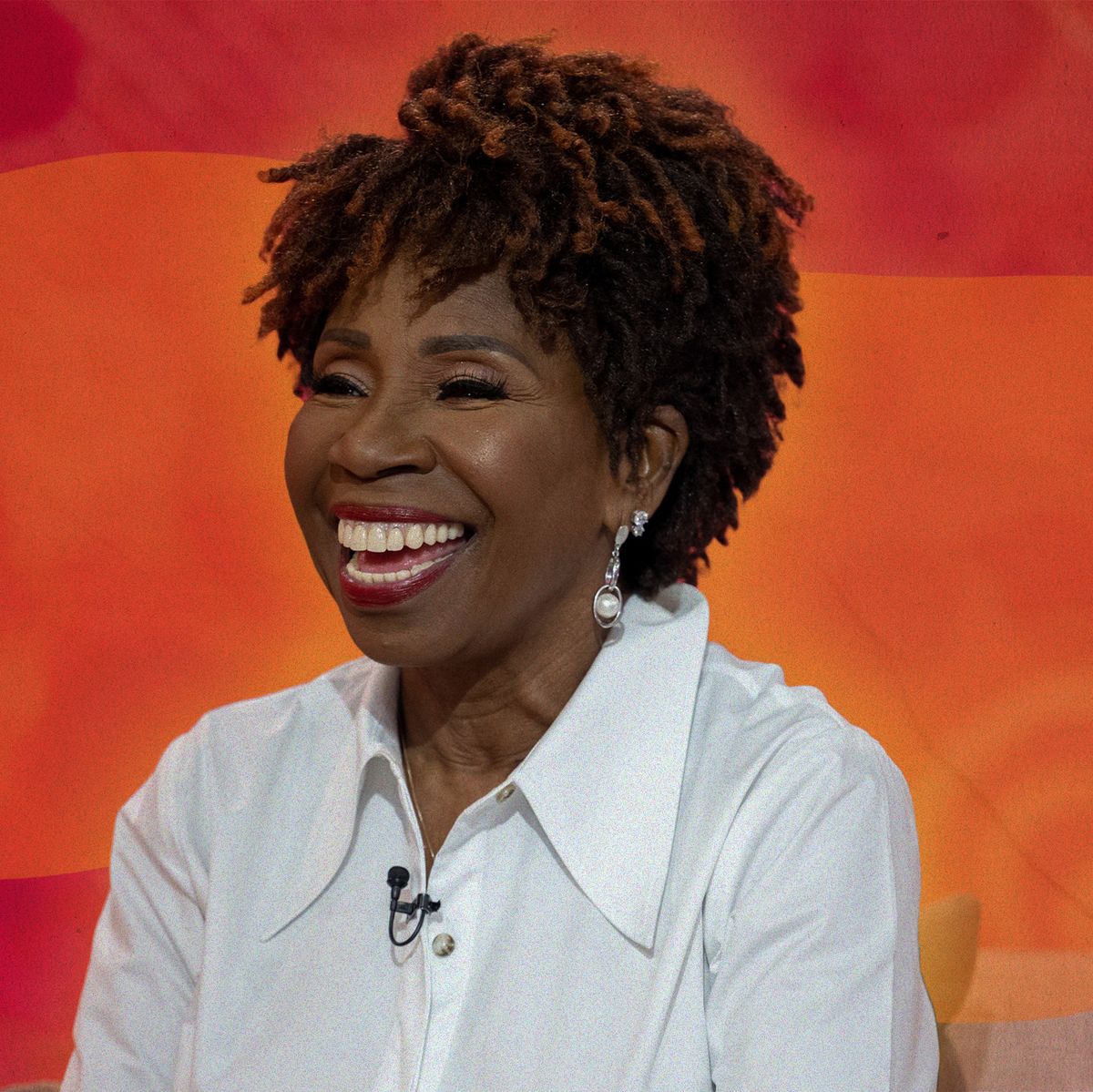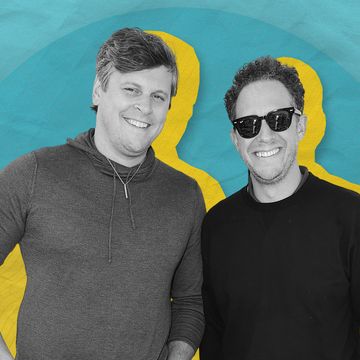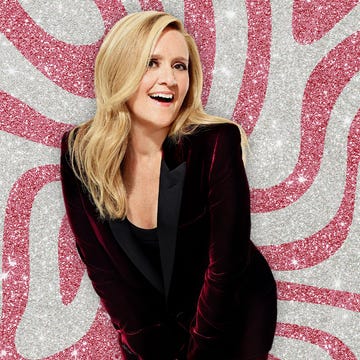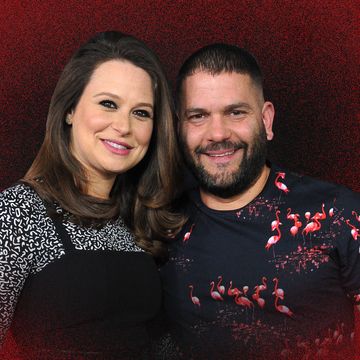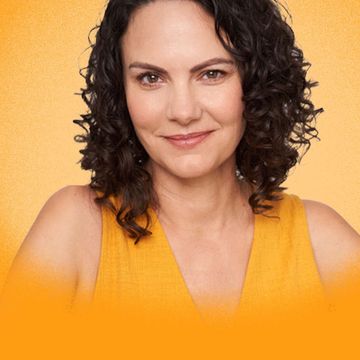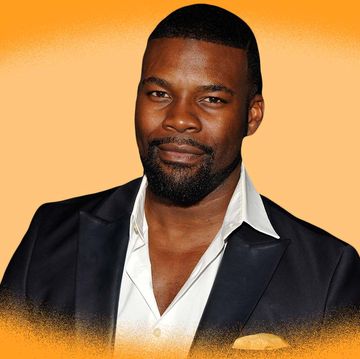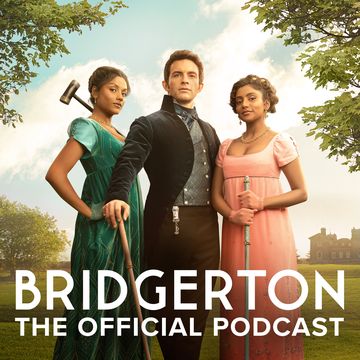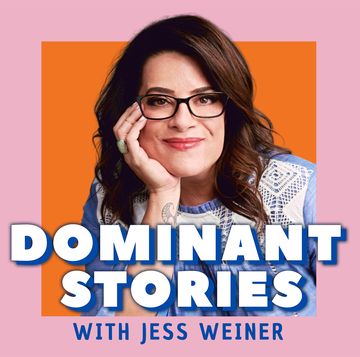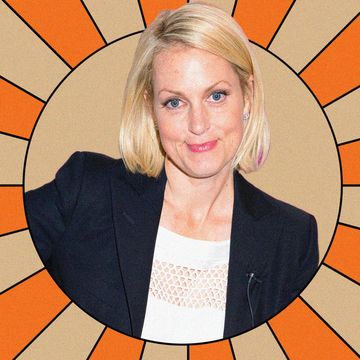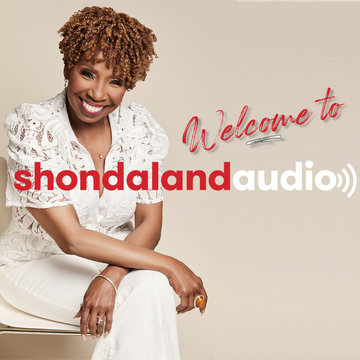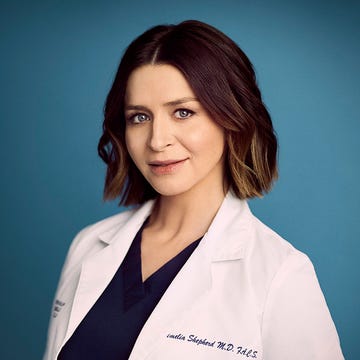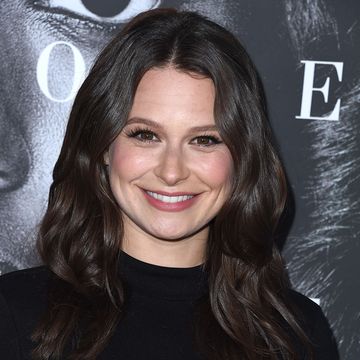Iyanla Vanzant has a large grin and often laughs loudly throughout our 30 minutes together on Zoom. This wouldn’t necessarily be something to remark upon except for the fact that she continually does it while recounting details of her life that might make most people cry. Vanzant also laughs at the joyous parts, but it’s the laughter at the tragedy that strikes me. So, I ask her: Are you one of those people who believe that if not for everything that’s happened to you — the good, the bad, and everything in between — you wouldn’t be where you are today?
“I don’t believe that; I know it to be true,” Vanzant says, the smile momentarily wiped from her face. “I don’t have to believe it, because it happened, and I’m here. What more evidence do I need?”
Vanzant is many things. She is an attorney, a life coach, an inspirational speaker, a spiritual teacher and life coach, a New York Times best-selling author of 15 books,and the former host of the OWN talk show Iyanla: Fix My Life. She is also a survivor and works every day to overcome the traumas of rape, sexual assault, poverty and abuse she faced throughout her life. She is also happy — “really happy with where I am today” — and adamantly affirms that she does not live by her enumeration of titles. Regardless, on the cusp of Vanzant’s 69th birthday, “podcaster” will be added to that list whether she adheres to them or not.
“I’ve been moving so fast for so long that to slow down is my greatest challenge,” Vanzant says. “Some days I’m like, ‘Okay, I need to be doing something.’ And then I say, ‘Yeah, you need to be sitting down on your behind there in the corner doing nothing.’ And then, I go do that [laughs]. With the podcast, I sit braless in my office and put on some headphones.”
Shondaland Audio’s The R Spot with Iyanla, a weekly podcast focusing on relationships of all kinds, premieres on Wednesday, August 3, and will see Vanzant continuing her work in examining, exploring, dissecting, and investigating relationship issues, before and after crises, all from the comfort of her own home. Vanzant will be putting her own life experiences and expertise to use, and her callers and listeners — dealing with everything from self-love to romantic breakups to mother-daughter issues — will get to identify these universal hardships in the interest of bettering themselves to give and receive all they are meant to in any relationship. As Vanzant often preaches, you cannot love others until you love yourself.
“I just think — and I could be wrong; I’m willing to be wrong — that The R Spot is a gift for such a time as this,” says Vanzant. “Because everything is about relationships: Ukraine and Russia, that’s a relationship. The Republicans and the Democrats, that’s a relationship. The Supreme Court and the women of this country, that’s a relationship. And when you look out into the world, our relationships are in breakdown, and we don’t have a clue as to how to go about fixing them. So, [I hope this podcast] will help to give people some updated information on the skills, the tools, the principles, the process of building healthy, loving, compassionate, functional relationships with ourselves, with each other, and with the world.”
Below, Shondaland discusses with Vanzant her early life, her struggles and triumphs to become who she is today, the ups and downs of being a public figure, and what we can expect from this season’s The R Spot. Be sure to subscribe to the podcast at iHeart, Apple, or wherever you get your favorite podcasts in order to get more of Vanzant’s signature style, and maybe, just maybe, you’ll learn a little bit about yourself in the process.
VALENTINA VALENTINI: I’d like to start at the beginning.
IYANLA VANZANT: I am a New Yorker to the bone! I grew up in Brooklyn, New York — the nation of Brooklyn — in the midst of poverty and dysfunction. My grandmother was a Native American who passed as Black because it was easier to be Black than it was to be a Native American. My mother was an alcoholic, and she was the “other woman” who lived in my grandmother’s house around the corner from where my father stashed his wife, my stepmother. And when my mother died from breast cancer and leukemia, I was 2. But they chose not to tell me because it was more convenient that way. And this was a time when children didn’t ask questions. So, I grew up being told that my stepmother was my mother, even though I didn’t look like her or sound like her. My father was a womanizer and had a very troubled soul.
VV: When did you find out about your mother?
IV: When I was 30, my stepmother — who was really the angel in my life — became critically ill. I was trying to complete law school and take care of her, and eventually we applied for, and she received, social security benefits. I wanted to use the money to move her into an apartment with me and my children so I could take care [of her]. She had lupus, though they didn’t know what it was back then. So, I signed the check, put the money in the bank, rented an apartment, and brought her to live with me. Maybe about a year later, my stepmom’s sister wanted my stepmom to repay her some funds that she’d used for private duty nurses when my stepmom was really sick. She asked my stepmom to pay her back when she got her social security benefits, and [the stepmother] explained that we’d used them to get this apartment. My aunt asked her how she did that, and my stepmom told her that I’d signed the check and got the apartment. So, my aunt reported me to the social security administration that I had forged the check. They called me in to investigate the matter, and in the process of that investigation told me that my stepmom was not my mother.
VV: That’s a long time to have something like that hidden. But hold on — we skipped over a lot and jumped to you being 30 and getting your law degree. How’d you get there?
IV: I was raped at 9, pregnant at 16, married at 19, three kids by 21. In the midst of postpartum depression after I had my last daughter at 21, I spent about six, eight weeks in the psychiatric ward after an attempted suicide. It was the best time of my life [laughs]. That’s when I found myself. I spent many days in silence, in prayer. That’s where I learned how to journal, how to get still, where I discovered that there was more to life than struggle and pain.
And that even if it was painful, it was purposeful. When I got out, I found that my husband had moved himself and my 6-week-old baby — well, she was 3-and-a-half months by the time I got out — in with his girlfriend [laughs].
VV: Why does that make you laugh?
IV: When I think about it now, it’s hysterical to me, the kinds of things that were just deemed as normal. It may have been normal in the world, but it wasn’t natural. But anyway, I got my baby back, and I struggled along for another three or four years in that marriage until I left. And then, I made a clear decision: “I gotta do better.” I didn’t know what better it was, but I knew it wasn’t where I was. It took me another four or five years, and one day, when I was 28, I was on the bus in Brooklyn, and there was a sign inside the bus that said, “Are you ready to change your life? Come to Medgar Evers College.” And I did. I got off the bus and went to the college and enrolled. I didn’t have any preconceived notion or a vision or even a plan. I had a desire to do better.
VV: Did there ever come a time when you thought, “Okay. I’m doing better”?
IV: When I stopped wanting to kill myself. That was one phase of when I knew I was doing better. When I allowed myself to want more than “just enough.” I used to want “just enough to feed the kids,” or “just enough to pay the rent,” or “just enough to get through till Friday.” When I allowed myself to think beyond “just enough,” I knew I was doing better. And when I felt good about myself and the little things, not the big things, like the fact that I figured out how to get to college every night with three kids, I felt good about that. I wasn’t focused on how hard the work was going to be or how many nights I had to take them with me. Better was incremental; a little bit at a time, I was better. I think sometimes we want so much that we don’t get the full opportunity of the healing and the growth that’s available in the “little bit at a time.”
VV: What you’re talking about here makes me think of that bit in the podcast intro: “I was terrible at relationships until I learned to love myself.”
IV: I didn’t know who I was. As an abused and neglected, sexually violated Black woman in the 1950s, growing up with a Native American who was passing for Black but teaching Native American culture on one side, and running to the church for Jesus to save her on the other side … I was confused. So, I was looking for somebody to give me what I couldn’t even identify. How can you give me what I want if I don’t even know who I am? And it took me a while to realize that I was re-creating everything that I had lived as a child in my relationships: I married a man who was emotionally unavailable, I found myself being not abusive but absent for my children’s needs, and I found myself in the level of poverty and despair as the same place that I grew up in.
VV: Is there somebody out there who influenced you the most?
IV: My children. They loved me when I was crazy. They loved me when I was broken. They loved me when I was wounded. They loved me when I was striving. They loved me when I was pushing to get ahead. They loved me when I was broke, and they love me when I’m wealthy. They love me unconditionally. They are what gave me the support, the desire, the energy that I needed to keep going. They went to college with me. They went to law school with me. My children have eaten more franks and beans and pot pies so that I could get an education, and they never complained. And everything that my children needed, I learned long after that they needed it. By the time I realized what they needed, their lives were in breakdown, and they loved me anyway.
VV: What you do now, would you say it is a calling?
IV: It’s a purpose. It’s purposeful. And if I hadn’t lived the way I lived and gone through what I went through, I wouldn’t be able to speak to so many people with integrity. I wouldn’t be able to see and feel and know what I see and feel and know. All the stuff that I teach about, I’ve walked through. I don’t teach healthy food preparation because when I get off the call with you, I’m going to get a fried chicken [laughs]. I don’t teach goal setting because I believe in intention and desire. So, what I teach and what I share is a function of who I am, not where I’ve been.
VV: What are the positives and the negatives of the professional life you’re leading?
IV: Number one is, it’s hard to go anywhere in public where people don’t see you and freak out. I’ve had people faint, I’ve had them weep on my bosom, I’ve had them threaten me, you know, because not everybody likes me. So, you definitely lose a certain level of privacy and anonymity. When people learn you’re on television, they think they know you, and they think you owe them a picture because they watch your show all the time. No, that’s okay. What I won’t lose is my freedom and independence. My grandmother scrubbed floors and toilets so that I could be free, so I’m not walking with security. I’m not doing that. “Leave me alone. I’m in the Walmart. Stay over there.” I’ll say, “Hi, how you doin’? All good.” That’s all we have to do. I don’t walk in that celebrity persona. But I guess it’s also a positive because I go to the restaurant, and they recognize me, and I get a good table, or a hotel gives me a great room [laughs]. I think the other negative is that people always want to know what my next thing is, and they expect your next thing to be better than the last thing. I remember when I was writing, primarily, and people kept asking me, “What’s your next book, and your next book, and the next book?” And I had written 15 books and really had never taken in and appreciated for myself that fact. Then when I was doing Fix My Life, people asked what’s next for me. Hell, I don’t know! I haven’t finished this yet! But I guess the good part of that is that it keeps me creative, keeps that door open, and gives me an opportunity to say no.
VV: But you said yes to The R Spot!
IV: Well, I’d done The R Spot on YouTube as a video series for about two years, and after the pandemic, recognizing how much trouble people were in, in their relationships, I had the idea to turn it into a podcast and talk to people. Plus, on Fix My Life, a lot of people would write in to say that they wanted to work with me but that they didn’t want to be on camera or on TV. The podcast is a way to do the work, do the teaching, the healing, provide the information, and give people anonymity.
VV: Why did you want it to be produced with Shondaland Audio?
IV: We shopped it around, and some of the companies wanted it because it was me, you know, my name, and that’s a lot of pressure. That’s a drawback. Shondaland, they could really see the vision.
VV: Can you shed any light on how you go about picking the topics and subjects of each episode?
IV: We had people writing to us, and we got so many letters! There was no way we could get to all those people — we’d be doing this podcast until the end of the Earth. I wanted it to be more electric, so now people call in. We announce online the day we’re going to do it, and people call, and I talk to them live because that live energy allows people to forget, and they become authentic and real, and they say what’s on their mind. That is so exciting to me. So, people call in, and I have a conversation with them, and sometimes it’s about a particular topic, and other times I’ll roll with it. And we just put it together so that people can hear the commonalities.
VV: Can you tease us with any highlights from this season? Any favorite moments for you?
IV: We’re still in production, but I think the two things that really touched me early on was the mother-daughter story. As I said in the show, my daughter stopped speaking to me. For the first time in my life, I’ve got a kid that doesn’t like me. And the other one was the woman who had breast cancer, where I talked to her about loving herself, because my mother died of breast cancer. That was almost a sign to me, like, “You can do this, baby girl. I’m right here with you.” And her story was just so beautiful — how she talked about surrendering her left breast to save her life. That was so beautiful.
VV: Do you think about your legacy at all?
IV: I have no idea what my legacy’s gonna be. [Pauses.] I probably own about 5,000 books, so maybe there will be the Iyanla Vanzant Library. That would be a legacy. I own probably 1,000 pairs of shoes. The Iyanla Vanzant Library of Shoes — that would be a legacy! [Laughs.] I have no idea. … My hope is that when my great-great-grandchildren are raising their children, they’ll remember to read them one of my books. That would be great.
Valentina Valentini is a London-based entertainment, travel, and food writer and also a Senior Contributor for Shondaland. Elsewhere she has written for Vanity Fair, Vulture, Variety, Thrillist, Heated, and The Washington Post. Her personal essays can be read in the Los Angeles Times, Longreads, and her tangents and general complaints can be seen on Twitter at @ByValentinaV.
Get Shondaland directly in your inbox: SUBSCRIBE TODAY
